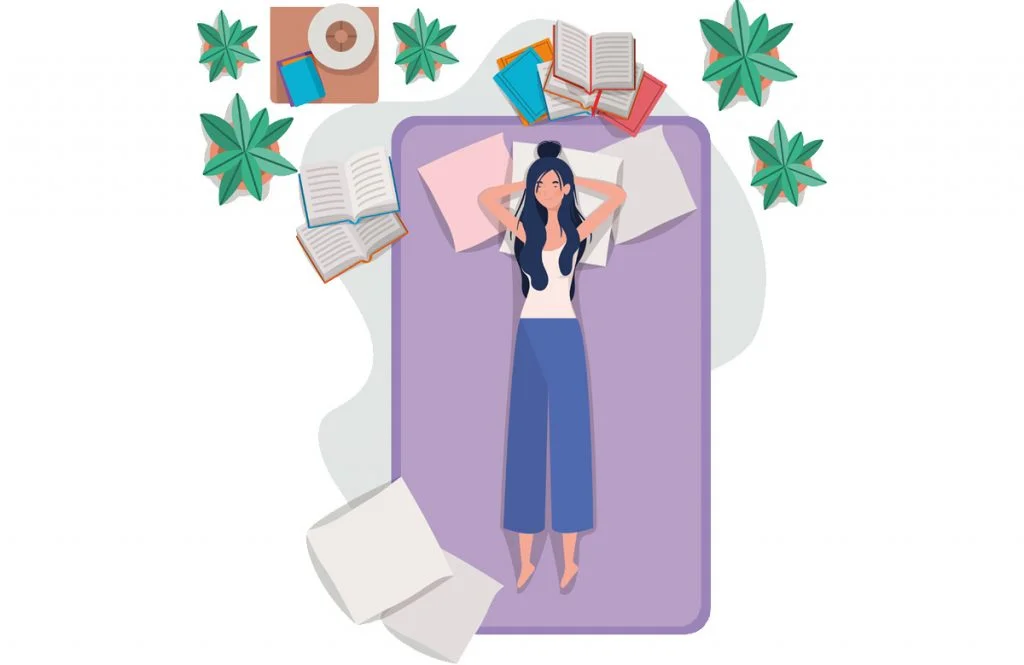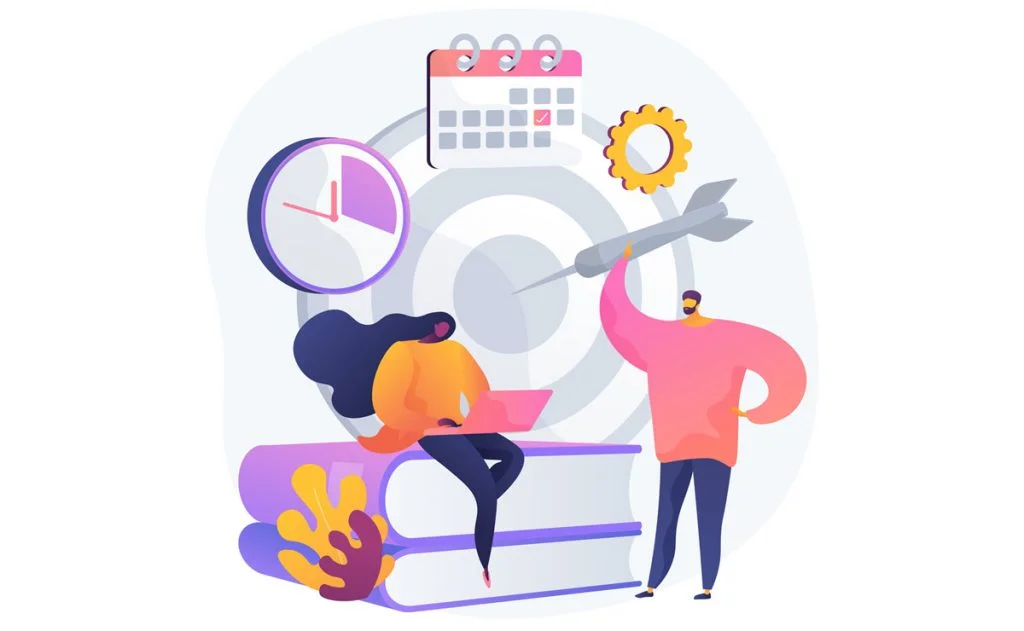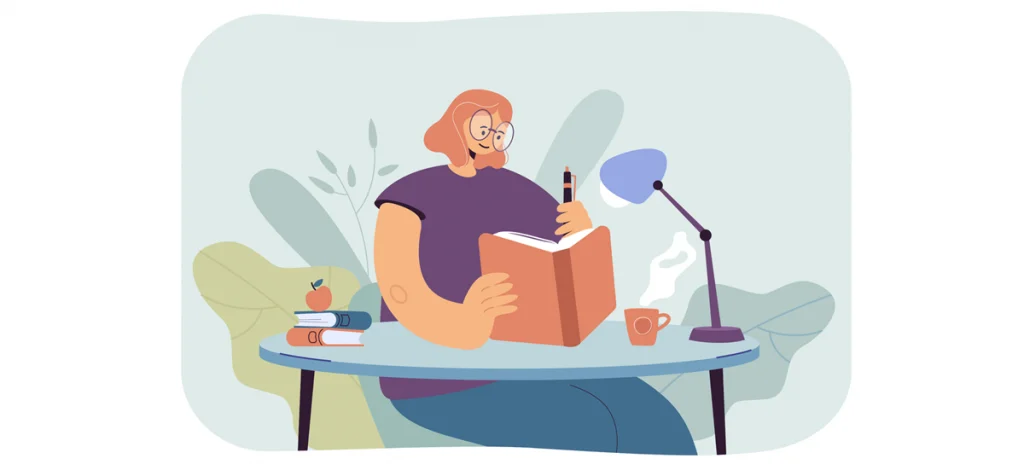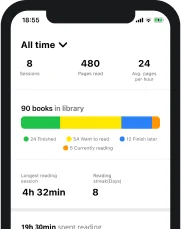Reading and sleep are both very important activities. But sometimes, sleepiness can interrupt your reading session.
You may ask yourself: “Why does reading make me sleepy?”
I’ll try to answer that question, and also provide other useful information on the subject.
Everyone has their own way of going through the day. We have a list of things we would like to get done on that day. We prioritize the most important things and afterward work through the things that aren’t as urgent. But oftentimes, we don’t get as much done as we would like. For some people, this happens quite often with regard to reading.
I myself sometimes lay in bed at the end of the day hoping to enjoy a book, but I often find myself falling asleep while reading. Perhaps this happens to you too sometimes. Some people read during the day, but even then become drowsy and sleepy.
Why does reading make me sleepy?
There are multiple factors that will cause people to begin to feel drowsy. While some can affect you more than others, it would be good to have a general idea of these factors, so that you can notice them when they begin to occur and address them properly and promptly.
1. Reading is relaxing
As we all know very well by now, reading is a great stress-relief tool. Reading can help us relax, it has a beneficial effect on our state of mind, and it can also have a magical effect on lowering our blood pressure and heart rate.
With daily stress being one of the most common issues when it comes to having trouble sleeping, it’s quite easy to understand how an activity that reduces stress in just a couple of minutes can help us fall asleep quicker and easier.
While all that may sound like a great thing, there are situations when the relaxing effect of reading goes against our best interest. Sometimes we just want to finish reading a book or a chapter and the activity relaxes us to the point where we actually fall asleep while reading instead of achieving our goals.
Granted, falling asleep is not the worst thing in the world, but it can still hold us back from achieving our potential.
2. Because reading is hard on your brain
Despite being one of the most relaxing activities you can choose after a long day, there is also another explanation for the fact that you can’t seem to do much reading without falling asleep. Reading is a rather complex activity for your brain, even though most of us tend to take it for granted, at face value most of the time.
One of the reasons why you constantly feel sleepy when you do some reading is the fact that it simply is a tiring activity. As you read, your brain is in a constant state of alert. It is working hard to process the visual signals from your eyes, decode the words, and create images in your mind. On top of this, background processes are constantly ongoing in the back of your mind, as the information you read is comprehended and new memories are formed.
On top of this, reading takes a certain level of concentration. Staying focused on any activity, especially when the activity is one that requires you to pay attention to details for extended periods of time, is without a doubt, exhausting. Sometimes, the reason why you fall asleep while reading is that the activity is simply exhausting you.
3. Because of poor lighting
More often than not, we tend to do our reading in relaxing environments. We all love the cozy feeling of reading while we cuddle up on a couch with the lights dimmed. It is comfortable, fulfilling, and nice. But poor lighting can be a huge setback for your reading sessions.
Why does reading make you sleepy when you’re doing it in a poorly lit room? We are diurnal creatures. As a species, we have evolved and are hardcoded to sleep during the night and work during the day. This very basic characteristic of ours is represented in our anatomy, and our brains are designed to respond to the way light changes in intensity naturally during the day. This means that light influences our awake/asleep cycles throughout the day. Millions of years of evolution have programmed our brains to be alert in bright light and increasingly drowsy as the light starts to dim and disappear completely.
As soon as the lighting in our home becomes weaker (when we dim the lights for a cozy reading session), our brain starts producing melatonin, the sleep hormone. Inevitably, this will put us in the early stages of falling asleep, and we will become increasingly sleepy from that point forward.
Reading in a poorly lit environment is less than ideal for more than one reason. Dim lights during reading sessions can also put additional strain on our eye muscles, which in turn will make us feel fatigued quicker. Fatigued eye muscles will decrease your reading performance, and can also cause some other pretty unpleasant effects such as headaches, and itchy or watery eyes.
4. Reading is a form of guided daydreaming
Another reason we tend to fall asleep while reading is the way it messes with our imagination. As you know, reading is a great way to enhance your imagination and disconnect from our day-to-day lives. According to some experts, the way reading stimulates our imagination is very similar to daydreaming.
This process of guided daydreaming that is provided to us by reading is quite similar in terms of the effects it has on our brain to actually sleeping. There are several common features that are shared by the two.
Getting lost in your imagination and losing yourself in a book is very relaxing, and puts us in a state of trance that can eventually lead to us sleeping sooner than we would have wanted.
5. Reading is a form of meditation
Falling asleep too soon after starting a reading session can also have something to do with the fact that reading invokes a meditative state. This is a result of two completely contradicting effects of reading.
On one hand, in order to read and comprehend and retain information, we are supposed to be focused. On the other hand, reading promotes the use of our imagination and encourages our minds to wander and wonder. This mix of being highly concentrated and imaginative at the same time triggers the same effect on our brain as a good meditation session.
Since meditation and mindfulness are, more than anything else, tools that help us relax and live our lives in a peaceful state, it’s quite understandable that one of the short-term effects are high chances of falling asleep.
6. Lack of sleep
Probably the most common factor which causes you to fall asleep while reading is the lack of sleep with which too many people have unfortunately become accustomed. The work atmosphere in the big cities is quite stressful. On top of that, people have their own personal problems which stress them out. Add to that the chaos and noise of the city, and it’s easy to see how people become tired.
But tiredness is not limited to the city. Hard work in the fields and tending to the livestock can also exhaust a person physically. Therefore, one of the elementary necessities for all these people, both from the city and from the countryside, is sleep. Sleep allows people to effectively recharge their batteries and renew their stamina so that they are equipped with the required energy for another day.
No matter how hard you want to focus on that book, or how interesting the unraveling plot is, if you haven’t slept enough you will not be able to focus properly.
7. Body posture
Your posture will have very much to do with your mental acuity. My dad used to always tell me to sit up straight with my feet on the floor when working on my homework. While I didn’t admit it at the time, I begin to agree that the way you position yourself has a big impact on how well you do things. I would often study for my upcoming tests while laying down, but as you can probably imagine, my concentration wouldn’t be at its best.
Sitting in one position for a long time can cause your body to think that it is supposed to go to sleep. Oftentimes we like to read in a comfortable position, choosing a soft armchair or even laying down in bed. This is dangerous, however, because it may trigger our sleepiness.
Our body perhaps recognizes the fact that whenever we sleep at night, we are laying down. Therefore, if we lay down during the day, our body may automatically prepare for sleep.
8. Location
The place in which we do our reading usually will also have a significant impact on our mental awareness. A dark room with little or no natural light can have negative effects on your concentration and psychological outlook.
Also, the atmosphere of the room will impact your focus. If the room is stuffy and poorly aired, the lack of oxygen and the extreme quiet can cause you to fall asleep.
9. Boredom
We’ve all experienced boredom. It can be caused by multiple factors. Maybe you’ve been reading for the past few hours and are ready to do something else, or maybe you just don’t feel like reading today, or perhaps you’ve got a lot of energy and need to go for a run. Moreover, the book you’re reading might be horribly boring. Whatever the reason, boredom can be another factor that makes you drowsy while reading.
For some, reading is a boring activity in general. If you are a part of this category of people, reading is obviously going to have a devastating effect on your ability to stay awake whenever you pick up a book. But even if you like to read and manage to find joy and excitement in this activity, chances are that you are going to come across a boring book from time to time. Reading a boring book is an art and a science, but luckily, with the right mindset and a couple of good tools, nothing is out of reach.
10. Lack of discipline
Though we don’t like admitting this, our lack of discipline will often impact us negatively.
Reading takes concentration, and sometimes even mental exertion. Therefore, it is logical that our brain will tire after a while, and will start showing symptoms of fatigue.
Without the required discipline, we will soon succumb to the temptation of just taking a 5-minute nap, or of laying down to read, which will only contribute to further degradation of our reading attention, and may even lead to our falling asleep.
11. Eye-strain
Why do I get tired when I read? Well, as stated above, reading is an activity that requires concentration. Furthermore, your eyes need to focus on the text and keep moving constantly and precisely. This activity will obviously tire your eyes.
But the speed with which your eyes tire depends on the dimension and clarity of the text, as well as the surface from which you are reading it. Does this mean that reading is bad for your eyes? Not necessarily, but there are a couple of things that you will need to take into account.
Small and unclear text will clearly cause greater strain on your eyes and will cause you to lose focus and become tired more easily. Another risk factor is reading from screens, whether they be computers, smartphones, or TVs. The glare of the screen can cause, among many other negative effects, eye fatigue. This in turn may lead to overall fatigue which may cause sleepiness.
Give Your Reading Experience
An Extra Boost With Basmo
Track the books you read, monitor the time you spend reading and keep notes on your reading habits and how it makes you feel. You can set yourself targets for the time you spend reading and you can get notified whenever you’re behind on your reading time.
How to not get sleepy while reading?
Before we go into seeing how we can deal with the factors causing drowsiness while reading, I would like to make an important observation.
Some readers, while reading this article, may understand that sleepiness caused by reading is to be avoided in any and all situations. This is not true.
Many people actually appreciate and use the sleepiness induced by reading because it helps them get to sleep. Sometimes people lay in bed trying to fall asleep but are simply unable to. Apparently, reading is advisable for such situations, as it can help people momentarily forget about their worries and anxieties and sink their attention into something else.
Now that we’ve clarified some of the possible factors which can cause sleepiness while reading, I will try to provide some ideas on how to combat these situations in order for you to enjoy your reading sessions without falling asleep.
1. Make sure you get enough rest at night
As explained in the previous section, lack of sleep will keep you from being able to focus on your reading and from comprehending the text. Moreover, it can cause you to fall asleep while reading, compromising your reading session altogether. For this reason, it is important that you take care to get the rest you need each night.
A good way of doing this would be to design a schedule that you will respect faithfully. Getting up and going to bed at the same hour each day can help keep you better rested. Also, make sure the schedule allows you to get enough hours of sleep. It seems that for adults, the recommended sleeping time is between 7 and 9 hours per night.
If you make sure to get enough sleep, you should be feeling more refreshed. If your reading session is during the day, it should also help you concentrate on your book and enable you to comprehend the text better. It should also decrease your chances of falling asleep while reading.
2. Sit comfortably, but don’t compromise your posture
It is important for you to realize just how much of an impact your posture has on your mental outlook. If reading is truly important to you, then make a few sacrifices in order to benefit fully from it. If you lay down while reading, chances are you will snooze or lose focus. Try to find a comfortable but upright position when reading.
Obviously, it depends on what kind of reading you are doing. If you are studying for an exam or looking to increase your knowledge in a certain field, it may be advisable to go for a more serious posture, maybe even sitting at a desk. But if you are just reading for pleasure and to relax, you can obviously opt for a more comfortable place such as an armchair or sofa.
In any case, remember that your posture will affect your mental outlook and that if you are laying down you are exposing yourself to an increased risk of falling asleep while reading or of losing your concentration.
The best would be to find a comfortable upright reading condition rather than laying on your back on a bed when reading. Sitting on a chair or sofa is ideal.
3. Choose a well-lit and well-aired room
You may not be aware of this, but it seems that lack of oxygen can cause a person to feel sleepy, among other things. Regardless of how it impacts your reading, having a well-aired room is obviously something to be desired.
Even if it’s cold outside, gather up the courage and face the cold. Open those windows for a while in order for oxygen to replace the carbon dioxide inside your home.
If you often ask yourself “why do I fall asleep when I read?”, then you should also analyze the room you sit in while reading. If it is rather dark, with little or no natural light, this can be one of the big reasons for nodding off with the book in your hands.
In order to counter this situation, try pulling the curtains back and allowing the sunlight to come into your house. Another option is to take your book and head to the park, where you can enjoy nature, bask in the sunlight, and also read your book at the same time.
Don’t hesitate to turn your lights on while reading either. Having enough light, even if it’s artificial, will allow you both to stay awake for longer while reading and it will also keep the strain on your eyes to a minimum.
4. Find ways to defeat boredom
If what you read is of absolutely no interest to you, it might be a good idea to switch books and find something more to your liking.
Another way to fight off boredom is to take occasional breaks. Try to go for a run or a fast walk to energize yourself. After invigorating yourself, try reading again. Sometimes you can’t choose what to read, in the case of exam materials or other necessary reading, but you can still find ways to fight boredom and prevent yourself from falling asleep while reading.
Reading apps are well known for providing users with ways of making the reading experience better and more interactive. Whether it’s taking notes while reading, keeping a reading journal or simply tracking your reading sessions, reading apps are a great tool for readers of all levels and ages.
Basmo, the reader-friendly app, can help you find books that might be more appealing to you. It allows you to make book collections and wishlists, as well as to keep track of the books you’ve read and what your thoughts on them were.
On top of this, Basmo allows users to create visual quotes from their favorite passages in the books they are reading, with different fonts and colors, thanks to the integrated graphical editor.
5. Discipline yourself
Build a schedule and try respecting it. Little by little, start taking steps to ensure you follow your routine. Select an hour at which to read, and be faithful to it, but also make sure it’s at a time of day when you’ll be less tired and more capable of reading while paying attention.
Keeping track of your reading is essential for a good reading discipline. And again, a great tool to help with that is a reading app. They allow users to have a better overview of their reading habits and make creating a reading schedule a lot easier.
Basmo can help by offering you the possibility to set up reading reminders at the hours at which you schedule them so you never miss out on your reading sessions.
It might also be of help to have a reading target that you try to achieve. You can set yourself a target such as a book per month.
This may help you keep yourself accountable regarding what you decide to read. This may motivate you to apply yourself more seriously to reading.
6. Take care of your eyes
Long reading times can cause your eyes to become tired. There are exercises out there for relaxing your eyes and maintaining their health.
But be very careful with screens, and take measures to protect your eyes from the light they emit. Reading books is better than reading on computer or phone screens, both for your eyes and perhaps for your mental well-being, since you can keep away from all the distractions with a physical book.
7. Read with a purpose
If you’re struggling to stay awake every time you pick up a book to read, what you might be lacking is actually a clear purpose for the session or adequate reading goals. As we all know, our motivation is a decisive factor when it comes to our chances of success in pretty much any activity you can think of.
Reading is no different. Having a clear intention when reading, knowing why you are reading the particular book that is in your hand and what you’re looking to achieve through that reading session can give you the much-needed boost that is going to push you to stay awake for longer.
When it comes to goals, Basmo can help.
Our reading tracking app can help you set realistic goals for your reading and can make achieving them a lot simpler than you might think. You can use the app to set a daily goal for the number of minutes you spend reading every day, or you can set bigger-picture goals for the total number of books you will read throughout a year.
Your progress will be closely monitored and you will be able to see how close you are to meeting your goals through nice graphs.
8. Read in the first part of the day
Since fatigue plays a big part in the reason why you can’t seem to do much reading without falling asleep, a good, no nonsense solution would be to read whenever you are least tired.
That is, for most people, in the first part of the day. Reading in the morning can make the experience better and more fulfilling. Plus, the more rested you are, the better your chances of comprehending and retaining information will be.
Of course, that is not always an option and we know it all too well. But if you are serious about your reading goals and you want to not fall asleep while reading, you should take every opportunity you have to read in the first part of the day before fatigue takes over.
9. Keep it moving
Physical activity has a series of well-documented benefits for your brain. Among other things, exercise can delay the onset of mental fatigue. If you ever went for a run or took part in a fitness class at night, you may have noticed that falling asleep after intense physical activity is quite difficult.
While there are many causes for this effect, including an elevated heart rate, increased body temperature, and the constant release of certain hormones that keep you alert even when you no longer want to be, we can still take advantage of it when it comes to reading.
And no, we don’t mean that you should have a cardio session every time you have something to read in the evening, but it wouldn’t hurt to go for a 10 minute walk for example. While post-workout insomnia is definitely not something you should aim for, you can still use a 10% effect you can get from an exercise that requires less effort.
Take a short brisk walk, do some jumping jacks or a couple of pushups. That will keep you alert and will do you a lot of good.
10. Take enough breaks
Taking breaks while reading is nothing to be ashamed of. We generally recommend you to take a 10 minute break after every 50 minutes of reading. This will help you avoid the onset of fatigue, will allow your eye muscles to relax before getting any of the eye-strain symptoms I mentioned above, and will allow you to actually read for longer.
Conclusion
We’ve agreed that falling asleep while reading is something that happens to many of us often. If we actually consider reading something important in our life, then we should take measures to apply ourselves to it and pursue it while being wide awake.
By working on factors such as fatigue, posture, and other aspects, we can try to improve our focus and prevent ourselves from dozing with the book in our hands.
I hope I’ve answered your question, “why does reading make me sleepy?”, and that you now have some ideas on how to tackle this issue.







